How football saved the life of a bitcoin miner
Once worth a cool $400m on paper, former banker and Sydney Swans AFL footballer Dan Roberts has since ridden the ups and downs of the bitcoin frenzy, and a cancer diagnosis.
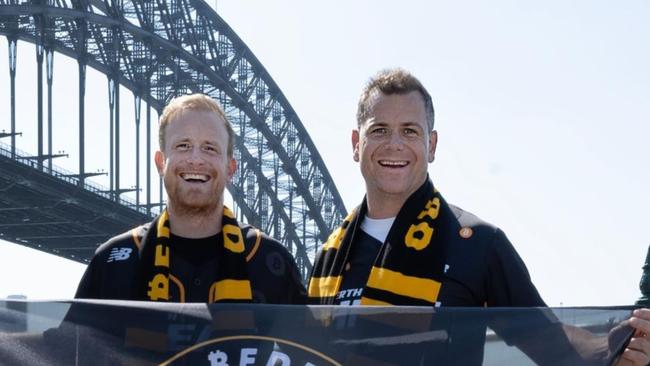
Two years ago Dan and Will Roberts were together worth a cool $400m, which was the paper value of their 20 per cent shareholding in Australian bitcoin miner Iris Energy.
The former Macquarie bankers had founded the firm – which mines bitcoin and owns its own data centre infrastructure in Canada and North America – in 2018 before it listed on the Nasdaq in America at the end of 2021.
But the timing of the listing could not have been worse.
Bitcoin lost two thirds of its value during 2022 and the rout continued into 2023 thanks to the collapse of many high-profile cryptocurrency firms, led by Sam Bankman-Fried’s FTX.
Iris Energy shares fell from their listing price of $US28 to a low of $US1.02 late last year.
But now, sitting in the suave dining room of Sydney’s Capella Hotel, Dan Roberts is sanguine.
“Money I guess is something that indicates whether or not you are adding value and have been successful because it is the bar and the ruler by which society works. That’s capitalism. But did I start thinking about what $400m can buy me? Not really,” Dan muses.
“I’ve got a house, I’ve got a holiday house up the coast, I’ve got enough to feed the kids. Everything else is more about having a purpose in life.”
Roberts says he worries more about the 450 investors who backed the company before its IPO and into the Nasdaq listing. Two of whom are his parents.
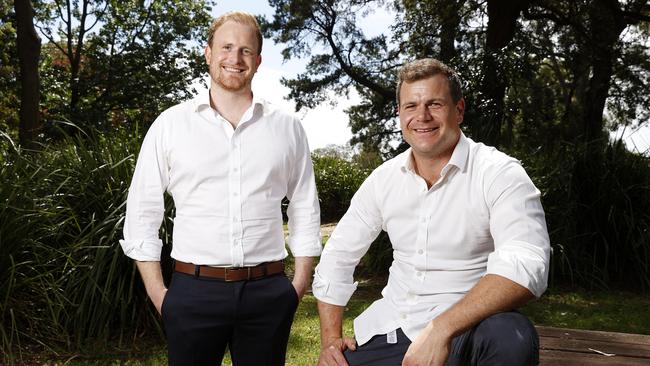
“I don’t think they had any concerns per se about us going into business. They’re probably a little bit more risk averse than us,” he says, noting he believes they fully understand bitcoin mining, the process of creating new bitcoins by solving extremely complicated maths problems with high-powered computers.
The Iris share register includes Mike Cannon-Brookes’ Grok Ventures, Kerr Neilson’s Platinum Asset Management, Philip King’s Regal Funds Management and billionaire investor Alex Waislitz.
Geoff Wilson’s Wilson Asset Management sold the bulk of its holding in May last year.
“We had lots of personal friends and network contacts, people that trusted us with their money. I feel a great obligation to them to fight and toil as hard as we can to get the right outcome for them because they trusted us,” Roberts says.
Perhaps surprisingly given how demanding some can be, he claims he’s had little criticism from his wealthiest backers.
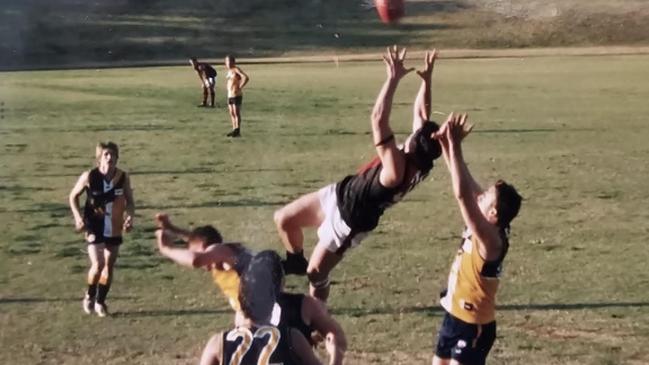
“I’d like to think it’s a testament to hopefully how transparent we were about the successes and the challenges. I think people understand that when bitcoin runs up to $65,000 and we nail the IPO at the absolute top of the market and then it crashes down back to $15,000, there are a few things outside of your direct control.”
The bitcoin price has risen 34 per cent over the past month, and while Iris’s share price has been on a rollercoaster ride – it is now trading around US$3.10, down from over $US7 in mid July and 85 per cent lower since listing – analysts covering the stock continue to be optimistic.
They claim Iris has at least met and often exceeded targets given at the Nasdaq listing, on expansion and efficiency of its operations.
There is a six-year age difference between Dan Roberts, who turned 38 this year, and his younger brother, Will, who is co-CEO.
Roberts senior describes his brother as the more “inward facing” co-CEO.
“Will is really into the detail. He’s a finance guy, but he’s also the best engineer, the best lawyer, and his capacity to learn and pick up on anything and then challenge anyone on everything is absurd, quite frankly,” he says, before describing himself as “the loud talker” of the partnership.
“We are quite different in terms of how our roles are day to day. Whether that’s a function of our personalities or where we are at in terms of years of experience and what we’ve done, it just worked out that wayl” he says.
“But we’ve got incredible alignment on how we see the world.”
The hardest hit of all
Dan Roberts has one claim to fame unmatched by any member of the Macquarie alumni: he played several matches for the Sydney Swans AFL reserves team in 2003.
Starting off his football career as a half forward flanker but then ending up as what he terms “an old school full forward”, he shared the same locker as Swans goal kicking legend Tony Lockett at the Sydney Cricket Ground.
For more than two decades he played for the North Shore Bombers in the Sydney AFL competition, kicking 750 goals.
But it’s his last game in a lower grade in April this year that he will never forget.
He took a savage knock to his back, which broke one of his ribs. But used to living through pain, he still jetted off the next week on a previously planned trip to America.
When he arrived, he started urinating blood.
“So it was off to emergency where they told me I had bruised my kidney and to see a specialist when I got home,” he recalls.
When he returned from America and booked in for scans, the urologist had some shocking news: a growth on the kidney looked like cancer.
Roberts initially refused to believe it. He and his family were scheduled to take off on a short holiday to Singapore the next day, so they went. While in Singapore he had further scans, and again the diagnosis was grim.
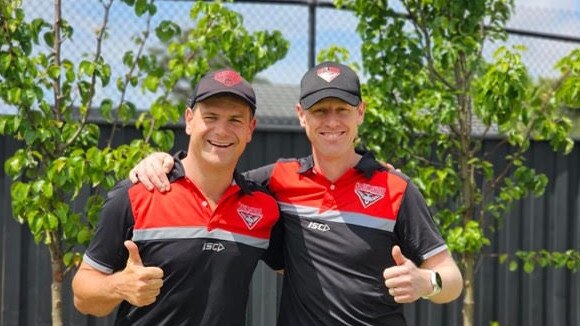
He admits his wife Anna and the family were “pretty rattled”.
“It was a few sleepless nights and my brother and I became very accustomed to scouring medical journals and research papers. We spent all hours of the night learning everything about renal cancer,” he says.
“Particularly with five young kids, you can’t stop your mind racing about the possibilities.
“Because there are so many unknowns. You just get told this and no one can tell you for sure that it hasn’t spread throughout the body.”
Upon returning to Sydney, the next day he was in Northern Beaches hospital having one of his kidneys removed. The doctors found a 7cm cancerous tumour growing at the bottom.
“I’ve had a few surgeries before in footy but nothing really prepared me for this one. I was just completely knocked out. It really hit me hard for a few days,” he says.
“They told me it was stage 3 and in another six to 12 months, I would have been in big trouble. But instead we got it early and cut it all out.”
Roberts is staying involved in football in 2024 as the co-senior coach of the North Shore Bombers.
Iris also sponsors the Real Bedford Football Club in the UK, owned by bitcoin investor and podcaster Peter McCormack.
Roberts credits wife Anna with doing an “amazing” job raising their young family while he has worked hard in recent years to build Iris.
Before Iris, Roberts worked in business development at Palisade Investment Partners, an funds management business in charge of $8bn in direct infrastructure assets across 23 businesses.
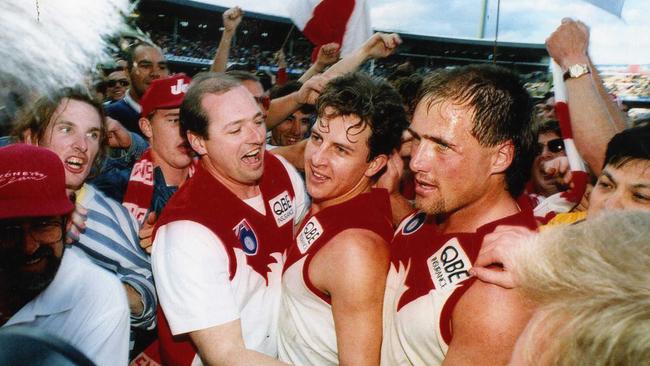
He was the second largest individual shareholder in the business before selling out a few years ago.
“Iris is probably not as bad as you might think because I’ve been through the experience of building businesses and the ups and the downs along the way and I’ve seen cycles,” he says, noting Palisade was loss making when he joined.
But Roberts says he learned his greatest appreciation for “good old hard work” during the six years before he joined Pallisade, working at Macquarie in Sydney and London.
“Every year you do there, it is probably worth two to three in the real world. You just work so incredibly hard,” he says.
“It is not just the hours of the day. It is the intensity. Certain personalities thrive in that environment. For others it is probably a bit too intense.
“So working across Sydney and London, especially during the GFC, I had many sleepless nights punching through financial models just getting up to speed on how the world works very quickly.”
A rebound from adversity
Roberts now firmly believes the worst is behind Iris after the firm more than halved its net loss to $US171.9m in the latest financial year.
“We’re seeing cash on cash every month at the moment. Yes we’ve got corporate overheads to fund out of that but that is indicative of kind of the margins and what we can get at an operating level,” he says.
A year ago the group defaulted on debts of $US108m, although Iris later said the debt was secured on specific assets and not on the main group.
The controversy prompted New York-based law firm Pomerantz to launch a class action claiming the Roberts brothers made false or misleading statements about the value of the group’s loans.
But Roberts is unperturbed.
In August Regal Funds Management portfolio manager Jessica Farr-Jones talked up what she claimed was the “asymmetrical risk-reward opportunity” in bitcoin miners like Iris, noting their top line can accelerate quickly in line with the bitcoin price off a fixed cost base, growing earnings rapidly.
Roberts believes bitcoin continues to have a value that should differentiate it from other cryptocurrencies.
“Bitcoin is the one that’s decentralised and open source software that no one can stop or control. The same cannot be said for any other cryptocurrency,” he said.
Unlike many other crypto miners, Iris uses renewable energy to power its operations.
In northern Texas it has built high-voltage infrastructure and transformation substations for 600MW of green power capacity, which is sold back into the state energy grid during peak periods.
In Canada, its data centre in British Columbia is powered by hydro-electric power and replaces a now closed pulp and paper mill in the region.
In its latest market update in October, Iris revealed it had partnered with WEKA, a data platform software provider for performance-intensive workloads, as part of its entry into the generative AI market.
The firm’s so-called next-gen compute and generative AI strategy, which traces back to a deal it did with Dell Technologies three years ago, will see some of Iris’s data centres powering generative artificial intelligence applications.
Roberts will proudly continue working “hand in glove” with his brother. His shock cancer diagnosis this year brought them even closer.
“He was in the trenches with me on that issue, just as I was continuing to be involved in the business as much as I am today,” he says.
“It’s now a bit of a blur, that period, but he was just straining for the detail, reading all these old reports on trials and different drugs and just coming out with contingency plans for me.
“The cancer is gone now but it kind of puts everything in perspective.”
While his mother was never a big fan of her eldest son playing football into his 30s, now she is thankful he took to the field in April for what proved to be his final match.
“My mother pestered me for probably the best part of a decade to give up playing,” Roberts says with a wide smile.
“I now remind her that footy might have actually have saved my life.”


To join the conversation, please log in. Don't have an account? Register
Join the conversation, you are commenting as Logout